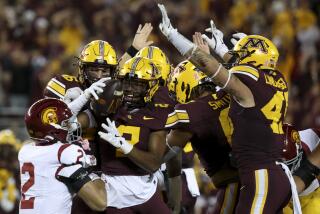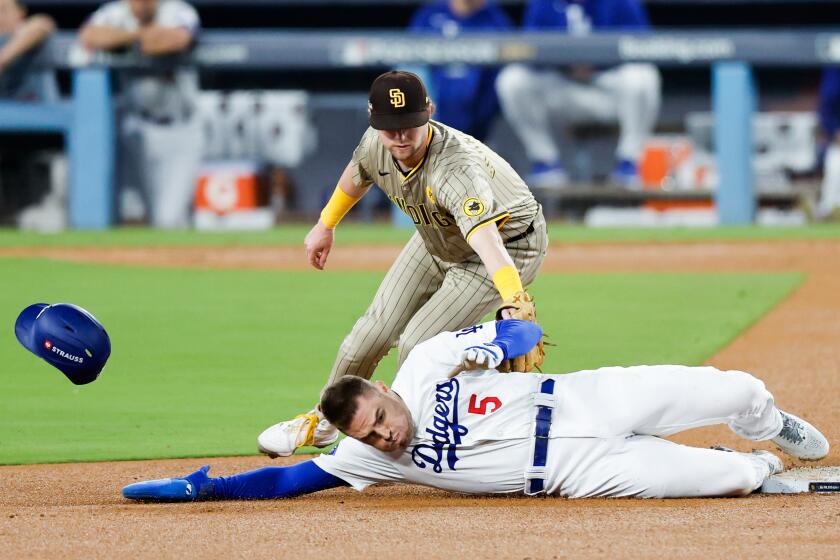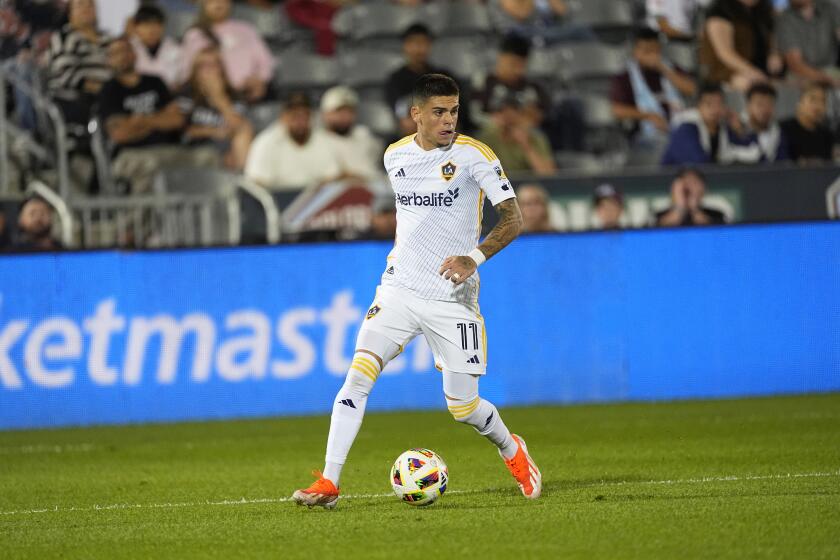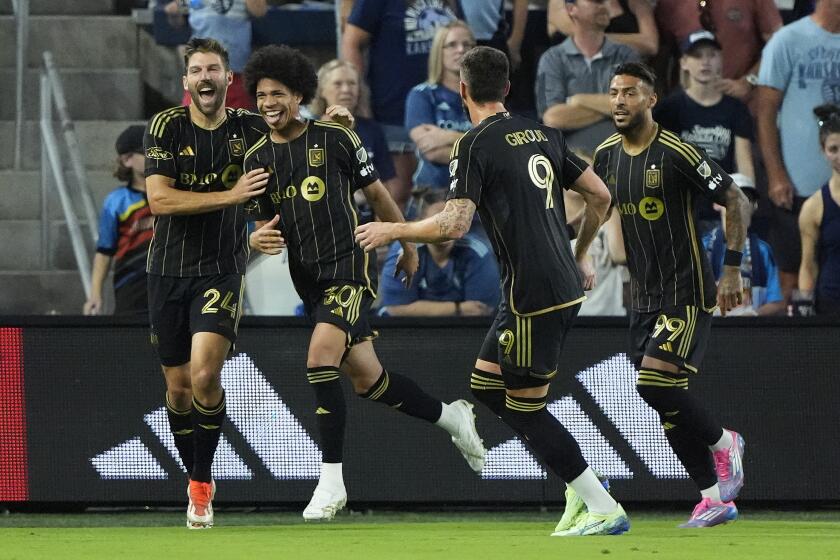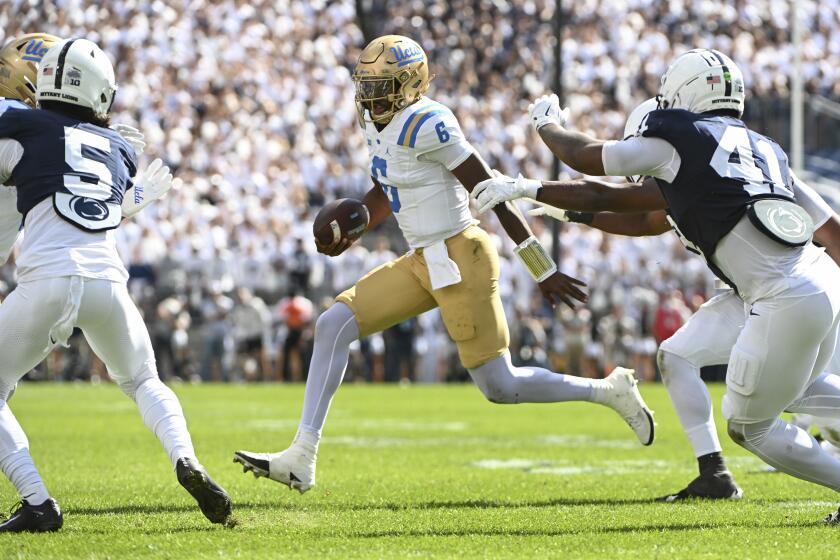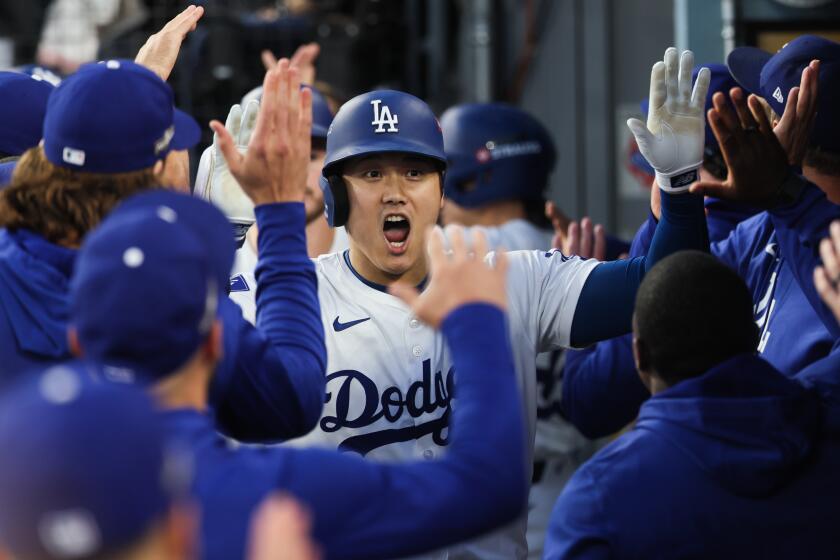Boston Started Out as a Winner
Stroll the grassy campus of Northeastern University in Boston, past the president’s office and the curved brick path marked “World Series Way,” and you see him: a tall bronze figure with a baseball in his hand.
Meet Denton True “Cy” Young, a star of the 1903 World Series, the inaugural meeting of the champions of the American and National leagues. The likeness of Young, a pitcher of some renown, leans forward in a frozen glare, as if cowing hitters, just as he did 98 years ago on the same hallowed patch of ground.
The site was then a ballfield, one-time home of the Boston Americans (now the Red Sox), who were--thanks to Young--the best by-gosh team in the American League. Their post-season opponents: the Pittsburgh Pirates, landslide winners of the NL. So it began, in 1903--the year that ushered in aviation, the Ford Motor Co. and the first “Fall Classic.” For nearly a century, America has basked in the adulatory glow of the World Series, an event that began as a casual wager between two club owners and mor phed into a prime-time extravaganza. The 97th edition, between the New York Yankees and the Arizona Diamondbacks, begins Saturday.
Who got the ball rolling? Buoyed by his team’s third straight pennant in ‘03, Pittsburgh mogul Barney Dreyfuss broached Boston about staging a “World’s Series” between the clubs. The offer was an olive branch. Owners in the older National League despised the upstart AL, which had organized in 1901 by raiding players from the established circuit.
Boston’s owner, a penurious fellow named Henry Killilea, liked the idea of the matchup (a playoff would add to his coffers) and plugged the idea to AL President Ban Johnson.
“Can you beat them?” Johnson asked. Killilea reckoned so. “Then, by all means, play them,” Johnson said.
Each side had its superstar. Boston had Young, who would retire in 1911 as the game’s all-time winningest pitcher and would lend his name to one of baseball’s coveted awards. Chubby and cagey at age 36, “Uncle Cy” managed 28 of his 511 career victories that season despite rumors that his arm was plumb worn out.
Pittsburgh had John Peter “Honus” Wagner, a burly, bowlegged shortstop who played his position with the grace of a man half his girth. Eight times the league batting champion -- no NL player has ever won more -- Wagner was known for his temperate lifestyle and for hobnobbing with working stiffs on downtown streets and trolleys. Fans loved him.
“He was a hulk of a man, a dirt-under-the-nails type in a blue-collar town,” says Wagner’s biographer, Dennis DeValeria, of Pittsburgh.
But Wagner had a dismal Series, making six errors and hitting a meager .222 -- more than 100 points below his lifetime average. Worse, the Pirates had lost two of their best pitchers down the stretch. Sam Leever, a 25-game winner, hurt his arm while trapshooting. And hard-drinking Ed Doheny (16-8) suffered a breakdown and was sent home, where he attacked his nurse with a stove poker and wound up in an asylum.
Boston won the best-of-nine Series, five games to three. Octobers would never be the same, though few realized it then.
“No one knew the World Series would become an institution,” says Dick Johnson, curator of the Sports Museum of New England, in Boston. That explains why mementos from the first Series are rare. A four-page program from the Series would fetch as much as $30,000, sports collectors say. Two years ago, a 50-cent ticket to one of those Boston-Pittsburgh games brought a cool $23,000 at auction at Sotheby’s.
“There is more memorabilia left from the battles of Lexington and Concord than there is from the 1903 Series,” says Johnson.
It was, by all accounts, a rollicking occasion, marked by pageantry, gambling and raucous antics by well-oiled groups in bowler hats and three-piece suits. Players rode from hotel to ballpark in ornate, horse-drawn carriages. Overflow crowds shinnied up telegraph poles, clamored onto rooftops and even swarmed the field to watch games. Police held the mob at bay by roping off the entire outfield with firehoses, a scant 250 feet from home plate. Any ball hit into the rabble was a ground-rule triple.
Most vocal were Boston’s Royal Rooters, a throaty band of 300 Irish-Americans whose numbers included John “Honey Fitz” Fitzgerald, grandfather of President John F. Kennedy. The Royal Rooters would gather beforehand at “Third Base,” a neighborhood sports bar, then march to the stadium on Huntington Avenue and bedevil the Pittsburgh players.
“They brought rattles and drums, sometimes a whole band, and kept up a cacophony of sounds from beginning to end,” says Glenn Stout, a baseball historian in Uxbridge, Mass. “They sang popular songs of the day, over and over, rewriting the lyrics to get under the Pirates’ skin.”
Wagner, in particular, was taunted mercilessly, to wit:
Honus, why do you hit so badly,
Take a back seat and sit down.
Honus, at bat you look so sadly,
Hey, why don’t you get out of town?
In Pittsburgh, that club’s followers countered by throwing confetti onto the field in a vain attempt to distract Boston pitchers. As the Series progressed, Pirates’ fans rallied loudly around their newfound hero, Charles “Deacon” Phillippe, a pitcher who won all three of Pittsburgh’s games.
“After one game, they lifted Phillippe on their shoulders and carried him around the field, shouting, ‘Phil, Phil, Phillippe Phil, he can win and you bet he will,’ ” says Mark Armour, a historian in Corvallis, Ore., who has written extensively about the pitcher. “They shook Phillippe’s hand so much, he got worn out--and lost the next game to Cy Young.”
For Boston, Young won two Series games and William Henry “Big Bill” Dinneen took three, including a 3-0 shutout in the finale before a partisan crowd of 7,455. When the hapless Wagner struck out to end the game, The Boston Globe reported, “There was a roar that sounded as if a thousand lions were doing their prettiest,” and “everyone in the crowd seemed anxious to secure one of the victorious players as a human souvenir.”
The Series proved a financial success. Boston players garnered $1,182.60 apiece, a tidy sum at the time. The Pirates each earned $1,316.50, because Dreyfuss, their owner, divvied up his share among his players. Never since have the losers pocketed the larger sum.
Because the players’ cut hinged on gate receipts, the unusually sloppy play of the first two games--a split--fueled speculation that the outcome of those two contests was fixed, to prolong the Series.
“I suspect that what the players did was to say, ‘We’ll win this one, and you win that one, and then we’ll play it straight,’ ” says Stout. Early in the Series, he says, “guys were booting routine grounders, and catchers were throwing balls into center field.
“One newspaper noted that some of those plays ‘stuck out like a fur overcoat in July.”’
Betting on their own games wasn’t their incentive, says Stout, adding, “I believe the players probably did it to make as much money as possible, legitimately, through the gate.”
Boston’s victory validated the American League as a legitimate outfit but stuck in the craw of the NL, which refused to play for the title in 1904. But cash and fame proved too great a lure, and the Series returned in 1905 in the best-of-seven format still used today.
More to Read
Go beyond the scoreboard
Get the latest on L.A.'s teams in the daily Sports Report newsletter.
You may occasionally receive promotional content from the Los Angeles Times.


